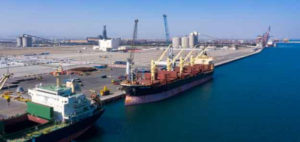Current investments exceed OMR 10.4bn
SOHAR Port and Freezone is renowned as one of the largest industrial and logistic projects in the Sultanate and the GCC.

Since the establishment of the Port sixteen years ago, and the establishment of the adjacent Freezone ten years ago, SOHAR has attracted a total of over OMR 10.4bn (US$ 27bn) worth of investment, valued as of mid-2020, the company indicated in a recent major report on the occasion of the 50th Golden Anniversary of the Sultanate of Oman’s National Day (18 November 2020).
This was a positive reflection of the company’s contribution towards achieving the Sultanate’s development goals and economic diversification efforts within the industrial and logistics sectors. These sectors are considered vital for the growth of the national economy, in addition to its pioneering role in generating more local job opportunities.
Unique Competitive Advantage
SOHAR Port and Freezone key advantage is its strategic location at the heart of global trade, acting as a gateway to the main shipping routes between East and West. It facilitates quick and easy transportation of goods to serve the demands of fast-growing markets, with a consumer reach of over 2.2bn across Africa, Asia and the Middle East.
SOHAR Port is one of the few global ports equipped with natural deep-water jetties of approximately 25m in depth, capable of handling the world`s largest cargo ships of up to 362m in length and over 400,000 tonnes.
The existing road network links the Port and Freezone to neighbouring countries, including the UAE, and will soon provide direct connectivity to the Kingdom of Saudi Arabia, one of the largest markets in the GCC. SOHAR provides unequalled access to the fast diversifying economies of the Gulf States without passing through the congested Straits of Hormuz. The Port receives over 3,000 vessels annually and handles an estimated 1.5mn tonnes of cargo each week, with the capacity to handle more than 2mn TEUs per year.
SOHAR Port is the main gateway for import and export in the Sultanate, with over 60% of the Sultanate’s imports entering through the Port. This is in addition to over 40% and 80% of exported and re-exported goods, respectively. The Port and Freezone play a vital role in connecting Oman to markets around the world, thus contributing to a stable supply of commodities to the local market, while providing local businesses with global outreach.
Apart from its prime location, the Port comprises of a large area of 21mn sqm, in addition to 45 million square metres of development at the Freezone, and offers the availability of renewable energy and cool water sources at competitive prices.
The Port management is also looking into alternative energy sources, such as green hydrogen, as part of its strategy to diversify its energy sources and reduce carbon emissions. Green hydrogen is a key component in global efforts towards renewable energy transition and is one of the alternative fuels that holds immense potential for future energy applications.
An Integrated Industrial and Logistics Hub
Both the Port and the Freezone are managed under a singular entity, making SOHAR the only complex of its kind in the region and enhancing its competitiveness in attracting foreign investments and companies in the industrial sector.
Vale Oman, a Brazilian multinational corporation engaged in metals and mining, is a tenant of the Port and imports ore from Brazil to convert into pellets at its iron ore pelletising complex.
Industrial Clusters Structure
SOHAR Port and Freezone is structured in innovative clusters, with companies and factories distributed amongst clusters and in close proximity to each other to facilitate accessibility and flexibility of operations.
The food cluster covers an area of 400,000sqm and has its own dedicated agro bulk terminal, unique to the region, to handle bulk food commodities.
Potential Expansions and SOHAR 2040 Vision
SOHAR Port and Freezone aims to position itself as an integrated logistics hub that offers the latest global technologies, while maintaining the highest standards of sustainability for all its activities. This makes it aligned with Oman’s Vision 2040 and the Oman Logistics Strategy 2040 (SOLS 2040), which is supervised and implemented by ASYAD Group, Oman’s integrated logistics provider.
Phase 1 of the expansion was completed by the end of last year and 500,000sqm was leased out. Work is in progress on Phase 2, which will see the addition of 2mn sqm.
At SOHAR Freezone, the first phase has been developed, with over 63% of the 5mn sqm leased out and home to warehouses, office spaces, industrial and logistics service providers, as well as cold-storage solutions to serve food exporters and importers. There are currently 44 industrial projects at the Freezone, encompassing various sectors.
With Phase 2 of the expansion recently launched by the Freezone management, the area will see an additional 5mn sqm of land ready for lease. For the upcoming years, the primary focus will be on onboarding companies within the plastic and food industries, as well as those involved in mining, iron and steel, vehicle spare parts and renewable energy projects and activities.
Contribution to the National Economy
SOHAR Port and Freezone has contributed to supporting the national economy through various means. Since its establishment, the Port and Freezone have been able to provide over 24,000 direct and indirect job opportunities. The contribution of SOHAR to the national GDP was estimated to be over 2.8%, and valued at OMR 773mn (US$ 2.008bn) in 2017, as per the latest statistics from NCSI (National Center for Statistical Information).
Mark Geilenkirchen, CEO, SOHAR Port and Omar Mahmood Al Mahrizi, CEO of SOHAR Freezone and Deputy CEO, SOHAR Port, sent messages of congratulations and commitment to growth on the occasion of the Oman National Day.

